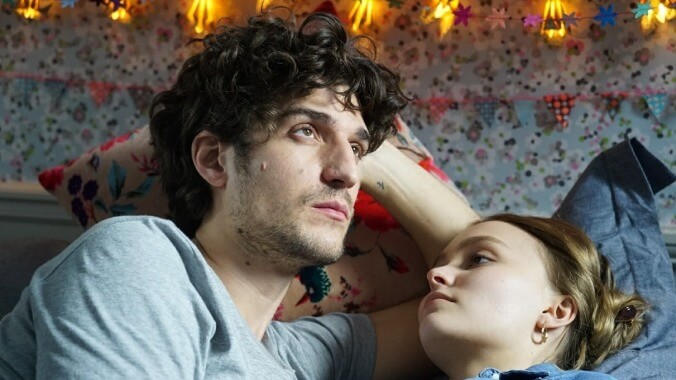Louis Garrel is still handsome, and still stuck in his dad’s shadow, in the frivolous A Faithful Man

Children of celebrities often strive to dissociate themselves from Mom and/or Dad, sometimes even going so far as to take on a different name (as, say, Joe Hill did). They want to feel confident that any professional success they may achieve was fully earned rather than merely inherited. Not so with French actor-filmmaker Louis Garrel, whose career has been unapologetically yoked to that of his father, the acclaimed director Philippe Garrel. With one exception, Garrel fils has either starred in or narrated every film made by Garrel père since 2005’s Regular Lovers, playing minute variations on the same feckless, floppy-haired romantic. And while Louis’ sophomore effort as auteur boasts a more lighthearted tone than Philippe’s work, A Faithful Man tackles similar themes, unfolds in familiar Parisian locations, was cowritten by the great Jean-Claude Carrière (who collaborated on Phillippe’s two most recent films), and was shot by Irina Lubtchansky, the daughter of Phillippe’s former cinematographer, William Lubtchansky (who died in 2010). Almost inevitably, the result feels a bit warmed over. Its title could refer to Louis Garrel himself.
Instead, it signifies Garrel’s character, Abel, who’s first seen receiving the good news that his girlfriend, Marianne (Laetitia Casta, who’s married to Garrel in real life), is pregnant, immediately followed by the bad news that she’s been having an affair with his best friend, Paul, who’s the baby’s father. Leaping forward a decade, the movie then sees Abel and Marianne reconnect at Paul’s funeral, whereupon Abel takes her back with the same uniquely Gallic equanimity with which he’d let her go. Do complications ensue? Bien sûr. One of them involves Marianne’s son, Joseph (Joseph Engel), a precocious kid who insists that Mom murdered Dad with poison and suggests that Abel will be next on her kill list. Another surfaces when Paul’s younger sister, Ève (Lily-Rose Depp, herself the offspring of some fairly famous folks), decides that it’s time to act on the crush she’s been nursing for many years and begins openly pursuing Abel. This being a French film, Marianne instructs Abel to sleep with Ève, just to see whether he likes it. Before long, the guy’s lugging his suitcases back and forth between two apartments, caught in an absurd love triangle.
Garrel is quite classically handsome, and a streak of narcissism has always been part of his onscreen persona. (His belated appearance in the final scene of Xavier Dolan’s Heartbeats, drawing two of its main characters to him like a tractor beam without uttering a word, constitutes a truly superb joke.) Still, the direction that A Faithful Man ultimately takes, with two potentially dangerous women competing for Abel’s favor, threatens to push his self-regard into self-parody. Abel never comes across as much more than a passive collection of confounded expressions, and the movie, in an odd choice, declines to commit to his perspective, providing each major character with their own voice-over narration. Rather than lend depth to Marianne and Eve, this device mostly serves to overstate the obvious, thereby short-circuiting whatever intrigue the pseudo-noir “Is she or isn’t she?” subplot means to offer. Indeed, it’s unclear just what creative impulse inspired this project, other than a general desire to create something. Philippe Garrel’s films can be an acquired taste, to be sure, but each one positively rings with conviction. Running just 75 minutes and seemingly loath to move beyond superficial feints at both comedy and melodrama, A Faithful Man, by comparison, barely qualifies as a trifle.